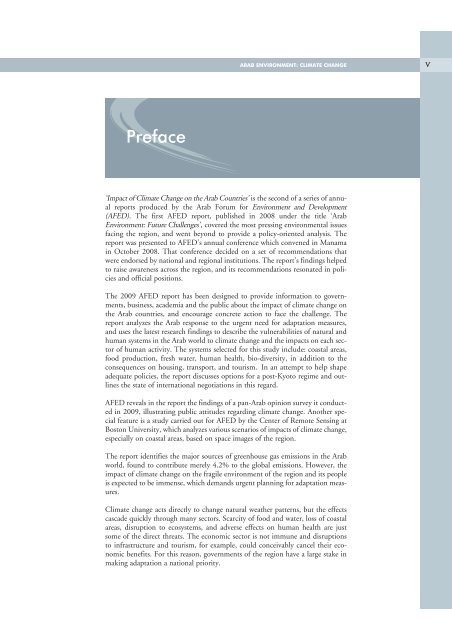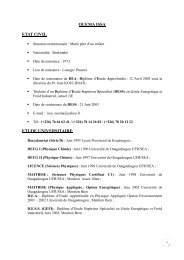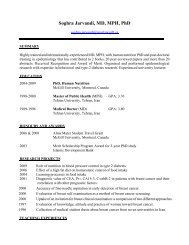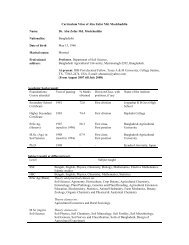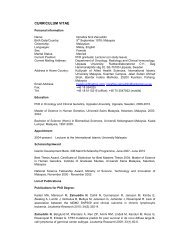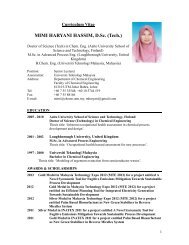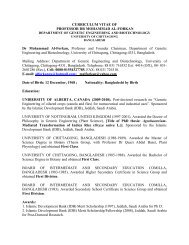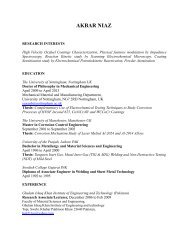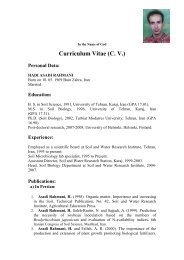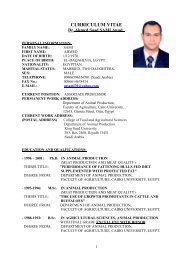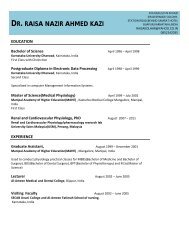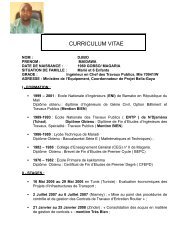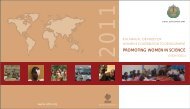Impact of Climate Change on Arab Countries - IPCC
Impact of Climate Change on Arab Countries - IPCC
Impact of Climate Change on Arab Countries - IPCC
Create successful ePaper yourself
Turn your PDF publications into a flip-book with our unique Google optimized e-Paper software.
ARAB ENVIRONMENT: CLIMATE CHANGE<br />
V<br />
Preface<br />
‘<str<strong>on</strong>g>Impact</str<strong>on</strong>g> <str<strong>on</strong>g>of</str<strong>on</strong>g> <str<strong>on</strong>g>Climate</str<strong>on</strong>g> <str<strong>on</strong>g>Change</str<strong>on</strong>g> <strong>on</strong> the <strong>Arab</strong> <strong>Countries</strong>’ is the sec<strong>on</strong>d <str<strong>on</strong>g>of</str<strong>on</strong>g> a series <str<strong>on</strong>g>of</str<strong>on</strong>g> annual<br />
reports produced by the <strong>Arab</strong> Forum for Envir<strong>on</strong>ment and Development<br />
(AFED). The first AFED report, published in 2008 under the title ‘<strong>Arab</strong><br />
Envir<strong>on</strong>ment: Future Challenges’, covered the most pressing envir<strong>on</strong>mental issues<br />
facing the regi<strong>on</strong>, and went bey<strong>on</strong>d to provide a policy-oriented analysis. The<br />
report was presented to AFED’s annual c<strong>on</strong>ference which c<strong>on</strong>vened in Manama<br />
in October 2008. That c<strong>on</strong>ference decided <strong>on</strong> a set <str<strong>on</strong>g>of</str<strong>on</strong>g> recommendati<strong>on</strong>s that<br />
were endorsed by nati<strong>on</strong>al and regi<strong>on</strong>al instituti<strong>on</strong>s. The report’s findings helped<br />
to raise awareness across the regi<strong>on</strong>, and its recommendati<strong>on</strong>s res<strong>on</strong>ated in policies<br />
and <str<strong>on</strong>g>of</str<strong>on</strong>g>ficial positi<strong>on</strong>s.<br />
The 2009 AFED report has been designed to provide informati<strong>on</strong> to governments,<br />
business, academia and the public about the impact <str<strong>on</strong>g>of</str<strong>on</strong>g> climate change <strong>on</strong><br />
the <strong>Arab</strong> countries, and encourage c<strong>on</strong>crete acti<strong>on</strong> to face the challenge. The<br />
report analyzes the <strong>Arab</strong> resp<strong>on</strong>se to the urgent need for adaptati<strong>on</strong> measures,<br />
and uses the latest research findings to describe the vulnerabilities <str<strong>on</strong>g>of</str<strong>on</strong>g> natural and<br />
human systems in the <strong>Arab</strong> world to climate change and the impacts <strong>on</strong> each sector<br />
<str<strong>on</strong>g>of</str<strong>on</strong>g> human activity. The systems selected for this study include: coastal areas,<br />
food producti<strong>on</strong>, fresh water, human health, bio-diversity, in additi<strong>on</strong> to the<br />
c<strong>on</strong>sequences <strong>on</strong> housing, transport, and tourism. In an attempt to help shape<br />
adequate policies, the report discusses opti<strong>on</strong>s for a post-Kyoto regime and outlines<br />
the state <str<strong>on</strong>g>of</str<strong>on</strong>g> internati<strong>on</strong>al negotiati<strong>on</strong>s in this regard.<br />
AFED reveals in the report the findings <str<strong>on</strong>g>of</str<strong>on</strong>g> a pan-<strong>Arab</strong> opini<strong>on</strong> survey it c<strong>on</strong>ducted<br />
in 2009, illustrating public attitudes regarding climate change. Another special<br />
feature is a study carried out for AFED by the Center <str<strong>on</strong>g>of</str<strong>on</strong>g> Remote Sensing at<br />
Bost<strong>on</strong> University, which analyzes various scenarios <str<strong>on</strong>g>of</str<strong>on</strong>g> impacts <str<strong>on</strong>g>of</str<strong>on</strong>g> climate change,<br />
especially <strong>on</strong> coastal areas, based <strong>on</strong> space images <str<strong>on</strong>g>of</str<strong>on</strong>g> the regi<strong>on</strong>.<br />
The report identifies the major sources <str<strong>on</strong>g>of</str<strong>on</strong>g> greenhouse gas emissi<strong>on</strong>s in the <strong>Arab</strong><br />
world, found to c<strong>on</strong>tribute merely 4.2% to the global emissi<strong>on</strong>s. However, the<br />
impact <str<strong>on</strong>g>of</str<strong>on</strong>g> climate change <strong>on</strong> the fragile envir<strong>on</strong>ment <str<strong>on</strong>g>of</str<strong>on</strong>g> the regi<strong>on</strong> and its people<br />
is expected to be immense, which demands urgent planning for adaptati<strong>on</strong> measures.<br />
<str<strong>on</strong>g>Climate</str<strong>on</strong>g> change acts directly to change natural weather patterns, but the effects<br />
cascade quickly through many sectors. Scarcity <str<strong>on</strong>g>of</str<strong>on</strong>g> food and water, loss <str<strong>on</strong>g>of</str<strong>on</strong>g> coastal<br />
areas, disrupti<strong>on</strong> to ecosystems, and adverse effects <strong>on</strong> human health are just<br />
some <str<strong>on</strong>g>of</str<strong>on</strong>g> the direct threats. The ec<strong>on</strong>omic sector is not immune and disrupti<strong>on</strong>s<br />
to infrastructure and tourism, for example, could c<strong>on</strong>ceivably cancel their ec<strong>on</strong>omic<br />
benefits. For this reas<strong>on</strong>, governments <str<strong>on</strong>g>of</str<strong>on</strong>g> the regi<strong>on</strong> have a large stake in<br />
making adaptati<strong>on</strong> a nati<strong>on</strong>al priority.


